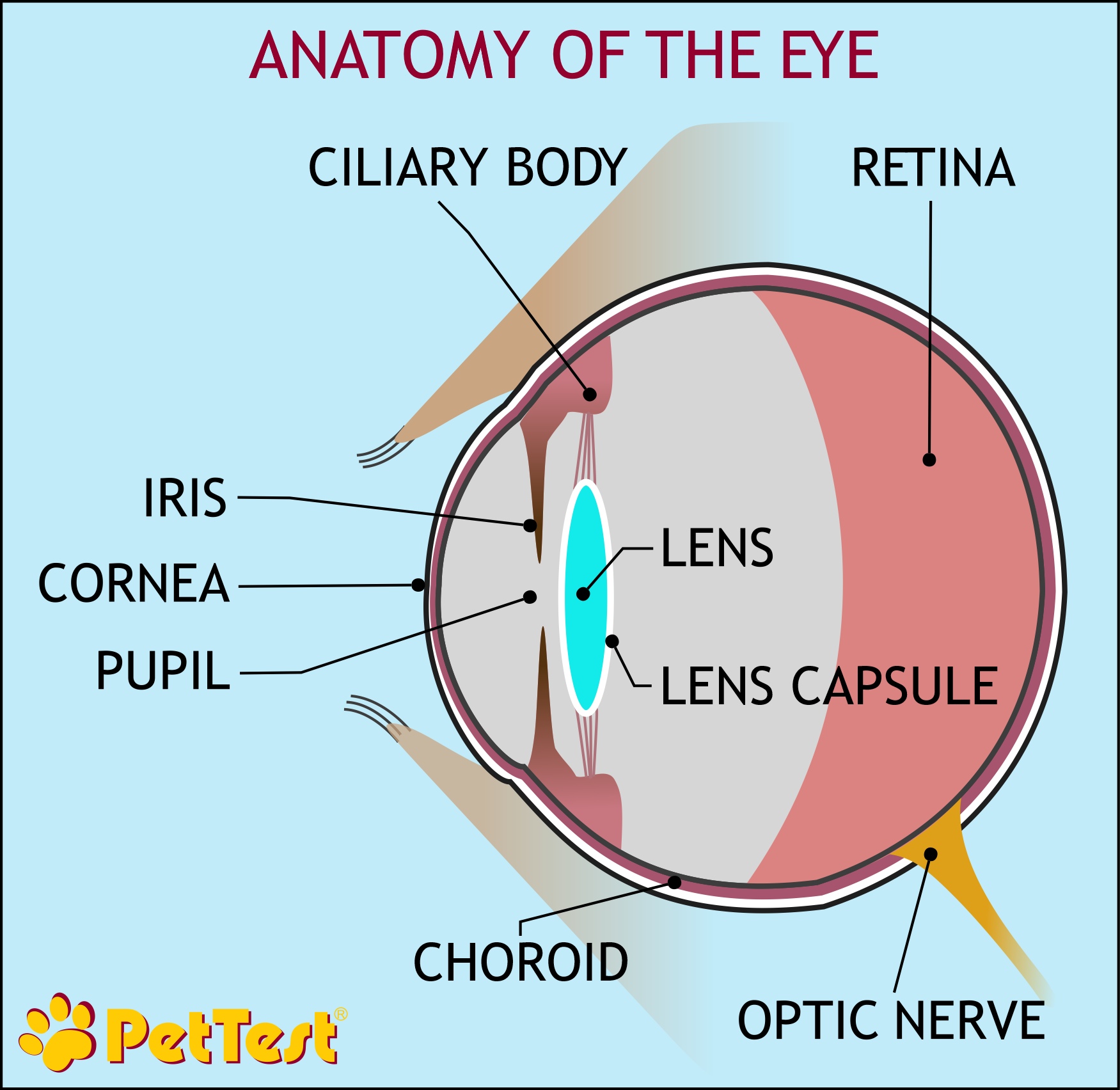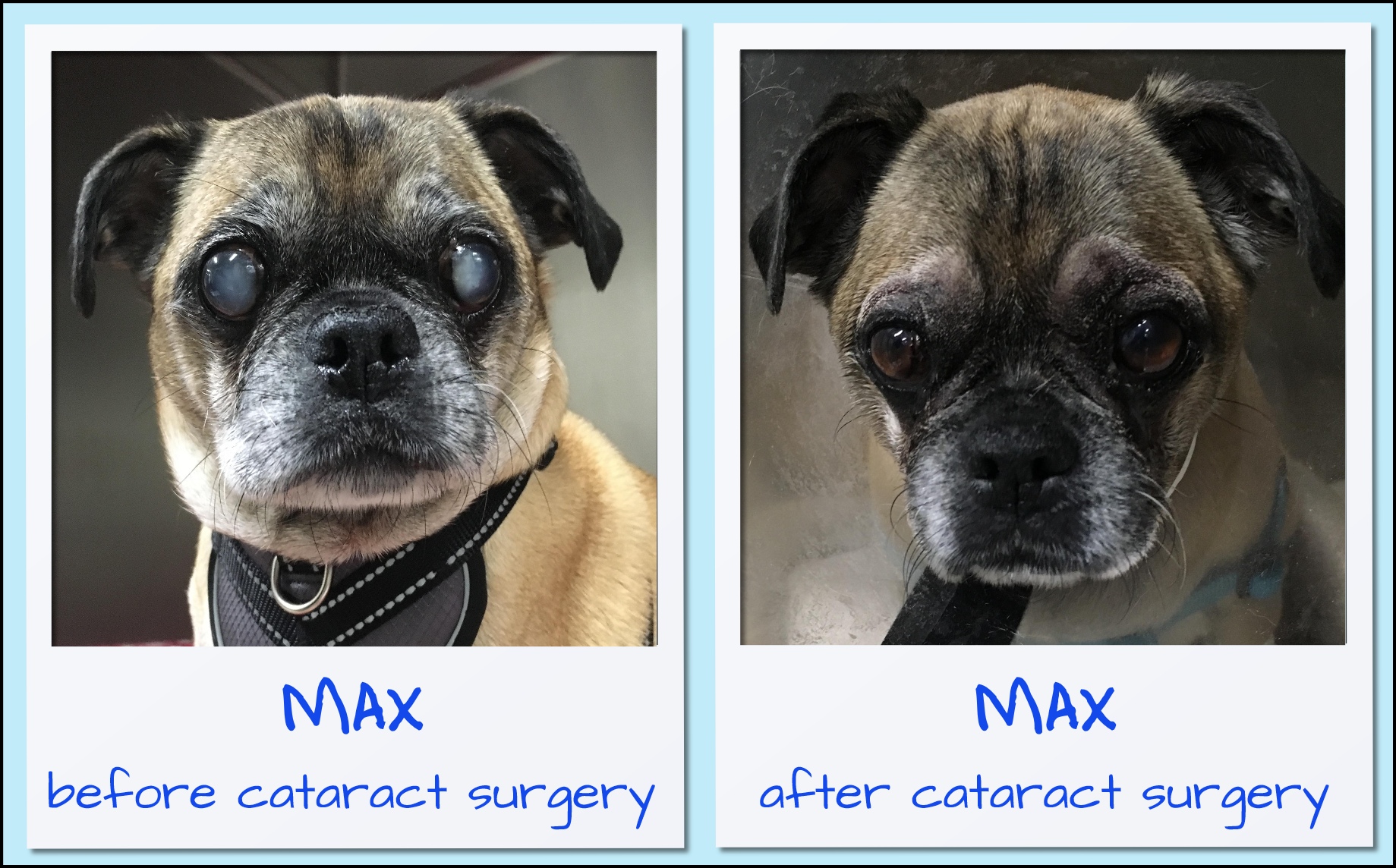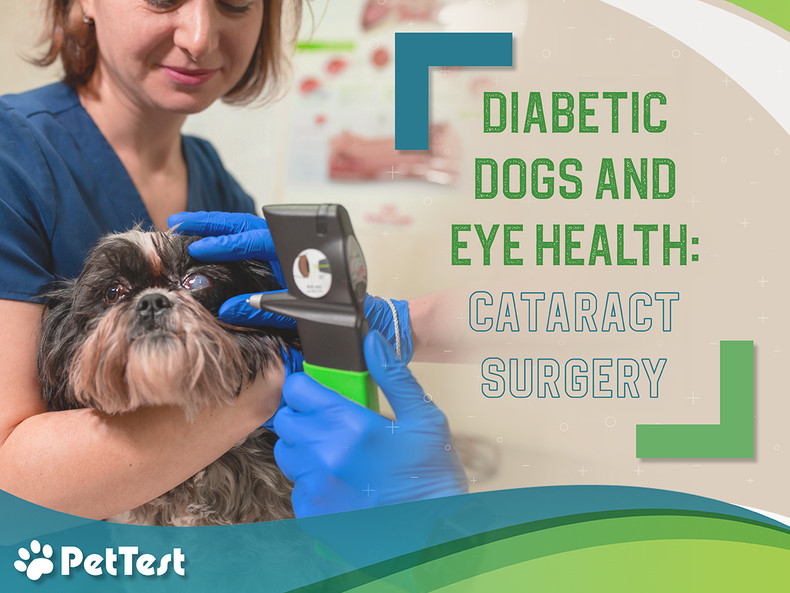Diabetic Dogs and Eye Health: Cataract Surgery
Last week’s blog touched on diabetic dogs and eye health, recommended supplements for overall eye health and common problems that our dogs have due to diabetes. Diabetic cataracts are an issue that is brought up constantly in our Facebook group Diabetic Dog Owners. Since up to 80% of diabetic dogs are diagnosed with diabetic cataracts and lose their sight from them questions about cataract surgery come up often.
What exactly is cataract surgery?
Diabetic cataracts are formed due to excess glucose being converted into sorbitol by enzymes in the eyes. The sorbitol collects on the lens and damages the lens fibers. Cataracts are formed and cause clouded vision, the continued build up leads to blindness.
When cataract surgery is performed the lens is removed and a synthetic lens is implanted. The lens capsule heals around the new lens and this keeps the new lens in place.

Today I want to talk about cataract surgery, the cost, the medication schedule and complications. Since Lucy never had cataract surgery, I interviewed our group moderator Christina Marrero who has sweet Max, he had successful cataract surgery on December 11, 2019.

MM: What was the approximate cost of the surgery, medications and follow up appointments?
CM: I am just over $8,000 for the surgery. And that is not including eye drop expenses. Here is a breakdown.
- $1200 for pre-op testing which included:
- Ultrasound, ERG (electroretinogram), bloodwork and urinalysis. This all had to be done within 30 days of the surgery.
- $5600 for the actual cataract surgery (this included the initial round of all meds)
- $140 for each post-op and we have had about 10 or so, the first one was a couple of days later and now we are at post-ops every 4 months.
MM: What eye drops did you have to give and what was the schedule?
CM: Here are the eye drops that Max was prescribed along with the schedule:
- Ofloxacin (antibiotic) – 4 to 6 times per day
- Diclofenac - 4 times per day
- Blood Serum (made with his own blood) – 4 to 6 times per day
- Cyclosporine - 2 times per day
- Dorzolamide - 3 times per day
- Timolol - 2 times per day
The Dorzolamide (glaucoma medication) was added because Max experienced post-op ocular hypertension. My vet ophthalmologist (VO) said it occurs in up to 40-60% of dogs and it can increase the incidence of glaucoma following surgery. That is why he insists on hospitalizing his cataract patients over night. If treated properly on onset that is not the case.
He is still on the diclofenac, cyclosporine and dorzolamide, probably for life but they are once or twice a day now and drops cost approximately $50 a month.
If you notice they were no steroid eye drops prescribed. My VO said they do not prescribe diabetics steroids and will only reach for them as a last resort. We really had zero complications .
MM: What kind of oral medications did you give Max?
CM: Luckily, Max takes oral medications well; I just coat them with a little fat free cream cheese, and he takes them happily. These are the oral meds he was on:
- Carprofen
- Gabapentin
- Cefpodoxime (antibiotic)
I really lucked out with Max’s VO. If you look up cataract surgery in dogs research papers going back to like 1998, Dr. Biros wrote a lot of them. Daniel J. Biros DVM, DACVO is in the greater Boston area and I highly recommend him.
Dr. Biros was incredibly pleased at Max’s last post-op. He called the result fabulous!
MM: If you have any advice for people looking into cataract surgery, what would it be?
CM: My number one advice would definitely be to do your homework when choosing a VO. I know it is an awfully expensive surgery, but I would not choose a VO strictly based on the best price. Also, if you are considering it, the sooner the better because the success rate is higher.
MM: If you had to do it again, would you?
CM: I would 1000% do it again. I am so thankful I was able to give him that and that the surgery was a success. He did very well blind, but he is my little adventure dog, and I could not take away all the things he loves. So, for me, not having the surgery was never even considered.

Make sure that you speak with your VO, not all dogs are good candidates for cataract surgery. Most dogs that we see in the group have had successful surgeries, but there are cases where there are complications.
Some dogs are not candidates for lens replacement. Other possible complications are glaucoma, retinal detachment, scarring/opacification of the lens capsule.
A special thanks to Christina and Max for educating us on what cataract surgery entails! Here is a great before and after of Max.

Do you have questions or comments? Would you like to add something to the conversation? Please comment below!
If you are looking for a Facebook community to join for support, I have been an admin for Diabetic Dog Owners for four years. You can also join Canine Diabetes Support and Information on Facebook as well.

